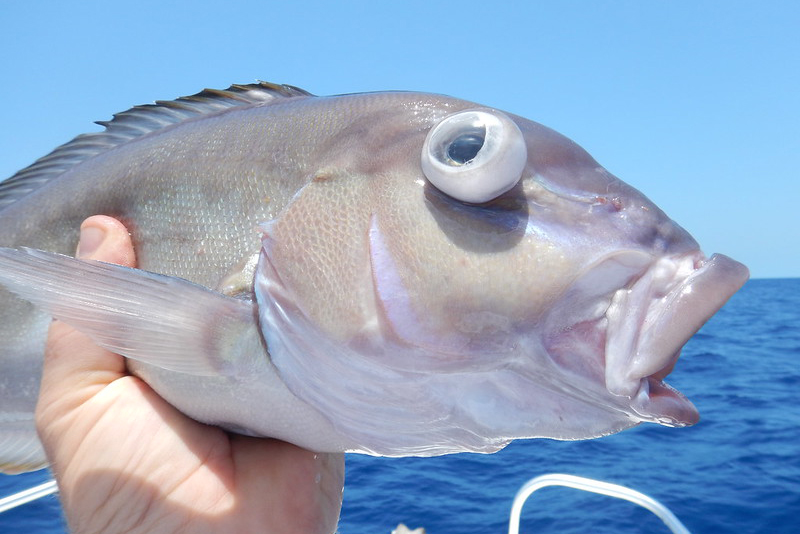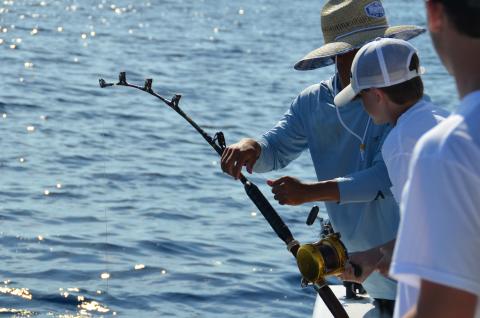Return ‘Em Right is an angler-driven initiative that will tackle release mortality from barotrauma to restore reef fish species injured by the Deepwater Horizon oil spill. The program offers Gulf of Mexico anglers an opportunity to sharpen their release skills when targeting reef fish like groupers and snappers. In return, anglers will receive release gear to use on the water. The gear and skills will help fish that are released get back down to the depths they typically inhabit and continue to thrive. Providing anglers with the knowledge and tools to successfully release reef fish will benefit today’s angler, the next generation of anglers, and the overall health of reef fish fisheries.
This initiative will help to implement the $30 million dollar “Reduction of Postrelease Mortality from Barotrauma in Gulf of Mexico Reef Fish Recreational Fisheries” project selected in the 2019 Open Ocean Restoration Plan 2.
Barotrauma, and How to Save Fish From It

internal damage and bloating.
Credit: Bryan Fluech/Florida Sea Grant
Barotrauma is a pressure-related injury caused by reeling in a fish from depth. This injury occurs when gases expand in a fish’s tissues and organs causing internal damage and bloating. When released at the surface without relieving the pressure, fish can struggle to return to the bottom and consequently die. Discard mortality, or death after release, is estimated to affect millions of fish each year. Adopting best release practices can greatly improve the survival of released reef fish and reduce waste in the fishery.
Return ‘Em Right focuses on training anglers to be situationally aware. This includes being prepared with the tools necessary to successfully release fish, recognizing signs of barotrauma, and knowing what to do when you encounter it. Barotrauma is sometimes treated using a venting tool to release gas from a fish’s swim bladder and body cavity. This sharp, hollow device is capable of penetrating the abdomen of a fish in order to release the excess gas. Although venting can be effective if done properly, experts and research support the use of descending devices as the preferred method to release reef fish. Descending devices are weighted devices that help fish overcome buoyancy and symptoms of barotrauma by releasing them at depth. This reduces the number of reef fish that die after release. The devices come in a variety of forms including weighted inverted hooks, lip clamp devices, or box/crates capable of releasing fish at depth.
In addition to engaging with anglers to successfully descend fish, Return 'Em Right is seeking help from anglers to further document the effectiveness of these devices under different conditions. The project is also funding studies to address anglers’ concerns with predators interacting with caught and released fish. These efforts to increase the number of fish that get back down to depth safely and reduce depredation should result in an even better fishing experience for anglers.
How Can You Get Involved?

back down to their habitats and avoid
injury or predation. Credit: Adrian Gray
This program is seeking Gulf of Mexico reef anglers who are committed to learning best release practices and using them on the water. Starting now, federally permitted headboat and charter boat captains and crew will be eligible to take the program’s short online training module and receive free gear in return. Project partners will be reaching out directly to the federal for-hire sector with an invitation to take the module soon.
Opportunities for private recreational anglers to improve their release skills and receive free gear will be announced in Spring of 2022. If you are a private recreational angler and interested in the program, head over to the Return ‘Em Right website to pre-register for the training and release gear.
Gear distribution opportunities are expected to last for several years. Project partners expect to reach tens of thousands of anglers invested in helping more fish survive and support a healthier Gulf of Mexico.
Project Partners
Project partners include NOAA, Florida Sea Grant, the Gulf States Marine Fisheries Commission, and a coalition of anglers, small businesses, industry groups, state agencies, universities, government and non-government organizations.


